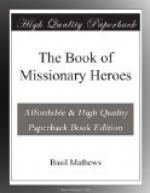Ruatoka was a brown Greatheart. It was with him as it must be with all brave sons who serve that great Captain, Jesus Christ: he wanted to be in the front of the battle. When the great Tamate was killed and eaten by the cannibals of Goaribari, Ruatoka wrote a letter to a missionary who lived and still lives in Papua. This is the end of the letter:
“Hear my wish. It is a great wish. The remainder of my strength I would spend in the place where Tamate was killed. In that village I would live. In that place where they killed men, Jesus Christ’s name and His word I would teach to the people that they may become Jesus’ children. My wish is just this. You know it. I have spoken.
RUATOKA.”
FOOTNOTES:
[Footnote 42: James Chalmers: see Chapter XIII.]
[Footnote 43: See Chapter II.]
Book Three: THE PATHFINDERS OF AFRICA
CHAPTER XV
THE MAN WHO WOULD GO ON
David Livingstone
(Dates born 1813, died 1873)
There was a deathly stillness in the hot African air
as two bronzed
Scots strode along the narrow forest path.
The one, a young, keen-eyed doctor,[44] glanced quickly through the trees and occasionally turned aside to pick some strange orchid and to slip it into his collecting case. The other strode steadily along with that curious, “resolute forward tread” of his.[45] He was David Livingstone. Behind them came a string of African bearers carrying in bundles on their heads the tents and food of the explorers.
Suddenly, with a crunch, Livingstone’s heel went through a white object half hidden in the long grass—a thing like an ostrich’s egg. He stooped—and his strong, bronzed face was twisted with mingled sorrow and anger, as, looking into the face of his younger friend, he gritted out between his clenched teeth, “The slave-raiders again!”
It was the whitening skull of an African boy.
For weeks those two Britons had driven their little steamer (the Asthmatic they called her, because of her wheezing engines) up the Zambesi river and were now exploring its tributary the Shire.
Each morning, before they could start the ship’s engines, they had been obliged to take poles and push from between the paddles of the wheels the dead bodies of Africans—men, women, and children—slain bodies which had floated down from the villages that the Arab slave-raiders had burned and sacked. Livingstone was out on the long, bloody trail of the slaver, the trail that stretched on and on into the heart of Africa where no white man had ever been.
This negro boy’s skull, whitening on the path, was only one more link in the long, sickening shackle-chain of slavery that girdled down-trodden Africa.




